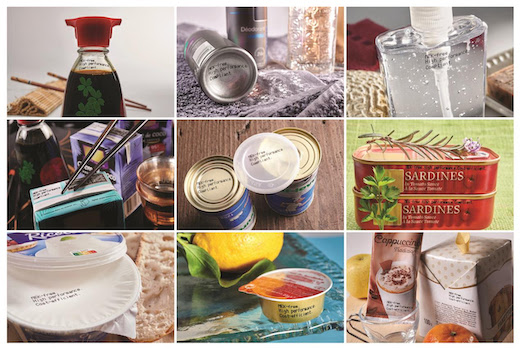Ink Raises Standard of Continuous Inkjet Coding for Fast-Moving Consumer Goods
Press release from the issuing company

The EB588 ink codes a wide range packaging types and colors more sustainably, without impacting profitability.
Black, multi-purpose ink enables safer, more sustainable fast-moving consumer goods (FMCG) coding, with fewer errors – all for the same total cost of ownership (TCO) versus traditionally-used, MEK-based options.
FMCG manufacturers face high expectations. Consumers want products which are as sustainably made as possible, at a good price, while retailers and distributors are quick to issue fines for poorly coded items which jeopardize traceability, data collection and/or automation. The ink launched today delivers on all these objectives by enabling better performance and sustainability, with no overall cost increase. Paired with the company’s flagship 9450 coder, the EB588 ink sets the new standard for FMCG inkjet coding.
MEK-based inks generate Volatile Organic Compound (VOC) emissions, contributors to greenhouse gases. This new MEK-free alternative, made of Methyl Isopropyl Ketone (MIPK), supports product sustainability by generating 40% fewer VOCs under comparable operating conditions at 20 0 C. It also promotes a safer work environment for workers.
Designed for use in Markem-Imaje’s 9450 continuous inkjet (CIJ) coder, one of the market’s leading inkjet printers, the ink also streamlines inventory and reduces waste.
The multi-purpose, black ink codes many different packaging types including metal, glass, cardboard and several types of plastic. Ordering, logistics and stock management are thus easier as there are fewer items to store and oversee.
Furthermore, as MEK-free inks use fewer consumables than MEK-based inks, manufacturers will have 40% fewer bottles and cartridges to throw away.
Waste is further minimized, as is rework, through the ink’s smart consumable management system which enables quick, mistake-free coding. There is no longer any risk of inserting an unsuitable ink which generates a poor-quality code, or worse, seems to code an item, only for the code to disappear hours later, or be easily rubbed off in the marketplace.
All operators need to do is insert the EB588 ink cartridge, something which can be done with the line running to avoid downtime. The coder takes it from there to check and set up parameters automatically, no further human intervention required.
For even greater efficiency and productivity, all consumable-related operations can be directly monitored on the user interface. Touch screen menus provide access to previous maintenance and production history, including data on availability rates and consumption. An accurate, consumable level display, bolstered by real-time warnings, lets users know the precise quantity of prints remaining, so production time is not lost due to the ink or additive running out.
This is in addition to the marketing and quality-enhancing capabilities already available through the 9450 coder itself. For example, Markem-Imaje is currently the only major supplier to offer built-in promotional coding, serialization and ‘mark & read’ code checking in a CIJ printer. And, with a large graphical printing capacity, QR code printing is easy and efficient. Production sites can thus better meet the demands of brand teams to use complex codes to support a wide range of marketing objectives, all with full confidence in code quality and accuracy.
Even better, the above benefits are available for the same TCO as other comparable MEK-based ink and printer combinations. This enables manufacturers to improve their sustainability credentials without negatively affecting their profitability – a win-win situation for consumers, retailers, distributors, manufacturers and the environment.
Visit www.markem-imaje.com for further information.
© 2025 WhatTheyThink. All Rights Reserved.













